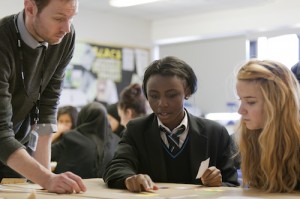Not long ago, and not far from where we live, ordinary people across Europe became complicit in the murder of their neighbours. What will young people’s education amount to if they do not confront this appalling truth?
For the Holocaust was a catastrophe not only for its millions of victims but also for our view of ourselves, of who we are, our faith in human nature, and a belief in western progress and ‘civilization’. If we are not prepared to consider what went wrong in modern society that allowed state persecution of political opponents; mass murder of the disabled; European genocide of the Roma (Gypsies); and ultimately led to an attempt to murder every last Jewish man, woman and child, then how can we consider ourselves to be educated people at all?
“You can’t interpret the world without understanding the Holocaust”
Learning about such events can be profoundly disturbing. Our programme helps teachers to support young people as they deal with powerful and sometimes disorientating feelings, helping them to express themselves and to develop their emotional literacy. It also explores how and why the Holocaust happened through detailed historical study of the most extensively documented, intensively researched, and best understood genocide in human history.
This combination of the affective and the cognitive realms is essential if we are to both strengthen a commitment to genocide prevention and, through careful comparison with other examples of mass violence, to better identify the warning signs of future atrocities and to understand what sort of interventions might be available in order to prevent them.
By Paul Salmons March 2014

